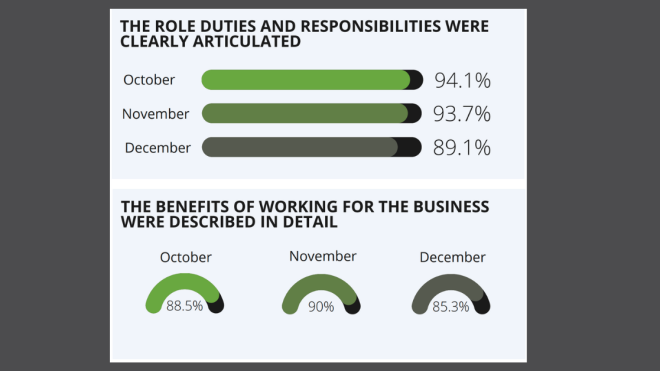Research compiled from the Recruitment Industry sentiment feedback platform RecruiterInsider shows over the last three years that hiring managers have been poorer at describing the company culture and how the candidate will fit in, as well as the benefits of working for the business itself.
If you are looking to upskill your hiring managers to ensure they can undertake an effective interview to maximise candidate attraction and minimise staff turnover follow our 15 point plan on conducting successful interviews.
1. Understand the Job Requirements
Before the interview, thoroughly review the job description and requirements to clearly understand what the position entails. Ensure that you can articulate the key duties and responsibilities of the position to candidates.
2. Prepare a Structured Interview Plan
Develop a list of questions and a structured interview format to ensure consistency among candidates. This helps you evaluate candidates fairly and objectively and will ensure you show candidates that you are well prepared for the interview.
Use a Rating System. Develop a rating system or scoring mechanism to evaluate each candidate’s performance objectively. This can make it easier to compare candidates.
3. Create a Comfortable Atmosphere
Begin the interview with a friendly greeting and some small talk to help candidates feel at ease. An approachable atmosphere can lead to more candid responses.
4. Behavioural Questions
Use behavioural interview questions that prompt candidates to provide specific examples from their past experiences. These questions can help you assess their skills, competencies, and suitability for the role.
Ask Open-Ended Questions and encourage candidates to provide detailed responses by asking open-ended questions. Avoid questions that can be answered with a simple “yes” or “no.”
Take control of the interview and don’t let candidates move off topic. If they do, politely bring them back by asking them to continue using the behavioural interview technique.
Evaluate Soft Skills. Assess candidates for soft skills like teamwork, communication, problem-solving, and adaptability. These skills are often as important as technical qualifications.
5. Listen Actively & Take Notes
Pay close attention to the candidate’s responses and jot down key points and noteworthy responses. Listen for both the content of their answers and their communication skills, such as clarity, organisation, and confidence. By taking notes you will also be able to remember and compare candidates later
6. Explain the Interview Process
Briefly explain the interview process, including the timeline for decision-making, to manage candidate expectations.
7. Avoid Biases
Be aware of unconscious biases that may affect your judgment. Focus on the candidate’s qualifications, skills, and experience rather than personal characteristics.
8. Provide Information About the Company
Give candidates an overview of your organisation, its culture, and its values and how they may fit into the team. This helps them assess whether they are a good fit for the company.
9. Invite them to Ask Questions
Allow candidates to ask questions about the role, the team, or the company. Their questions can provide insights into their level of interest and engagement.
10. Follow Legal Guidelines
Familiarise yourself with local and national employment laws to ensure compliance with your interview process. Avoid asking illegal or discriminatory questions.
11. Take Your Time
Don’t rush the interview process. Take the time needed to thoroughly evaluate each candidate.
12. Debrief and Compare Candidates
After all interviews are completed, gather input from colleagues or team members involved in the hiring process. Compare candidates and make a well-informed decision.
13. Provide Feedback
After making a hiring decision, offer constructive feedback to candidates, whether they were selected or not. This shows professionalism and can leave a positive impression of your organization.
14. Continuous Improvement
Reflect on each interview experience and seek ways to improve your interviewing skills over time. Learning from each interview can help you become a more effective hiring manager
If you would like assistance with improving you or your team’s interview techniques to capture the best talent, reach out to our team by clicking here or contact us on 1300 136 786.

